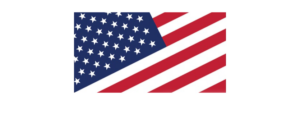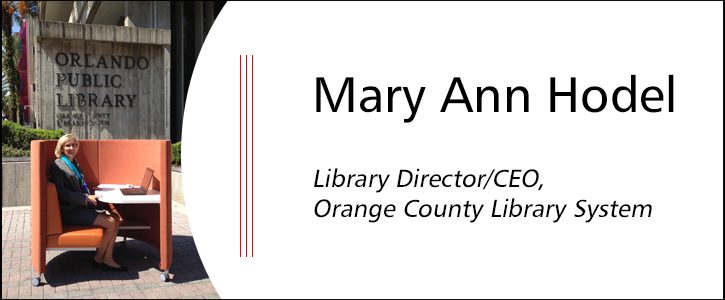
Many contemporary critics hear the term “maker-space” in the context of the library and laugh. Modern maker-spaces and learning centers within libraries are seen as passing fads, doomed to meet an end as quickly as they spring up. The Melrose Center at the Orange County Public Library System proving the critics wrong, with a learning environment that goes beyond the 3D printer and perpetuates the core mission of the public library- To be a valued, free resource center and haven of learning for their patrons.
AGATI sat down with Mary Ann Hodel (Library Director and CEO of the Orange County Library System), Ormilla Vengersammy (Technology and Education Center & Melrose Center Department Head at OCLS), Milinda Neusaenger (Admin Assistant at OCLS), and Debbie Moss (Assistant Director & Division Head for Technical Support), to discuss how The Melrose Center provides a number of hands on learning tools for their community that will prepare them for upcoming career paths, expose them to new opportunities, and allow them to try something they’ve never thought possible.
Q: What generated the idea to create the Melrose Center, going beyond the makerspace into other realms of hands on learning?
A: “Mr. Melrose contacted us wanting to speak to the director, and he presented the library with a 1 million dollar gift. We’d had ideas to do a “fab lab” and an audio studio, and video studio. The library facilitated a number of focus groups from the digital media scene and educators to provide ideas for the space and suggestions on how to make it work, which were quite helpful.Not all of them were used though. For example, one member suggested keeping the Center open 24 hours a day, but that wasn’t in the cards. It’s too difficult to close the rest of the library and only keep the one area functioning, but we tried to incorporate ideas as best as we could.”
“After presenting the idea to the director and getting approval for use of the second floor, we received the check and created the space. We hired architects and engineering specialists to help with the design, and the idea morphed with the addition of the simulator machines and skilled photography lab. We officially opened the Melrose Center on February 7th, 2014.”
“Also, since we’re librarians, we have to measure. So we’ve been measuring door traffic, which is steadily increasing. From August 2014 to August 2015, we saw a 70% increase in door traffic, going from 9,320 to 15,805 total entries into the library, directly correlated to the opening of the Melrose Center. And from September 2014-2015, we saw attendance rise from 7,936 patrons to 9,565 patrons.”
Q: What would you say is the most innovative aspect of the Melrose Center?
A: “Our Audio Lab is extremely professional grade – sound proofing, the console is professional level. We have different microphones, stands, speakers, and a fabulous staff of skilled audio professionals who teach anyone how to use the equipment and the set-up process, basically everything they need to know. From choirs to rock bands, anyone can use it. Professionals come to use the studio as well. It’s been a slight challenge integrating non-library folks into the library world. Personalities are hard to mesh sometimes, but the work is worth it to integrate as many people as possible because the outcome is a more readily prepared staff.”
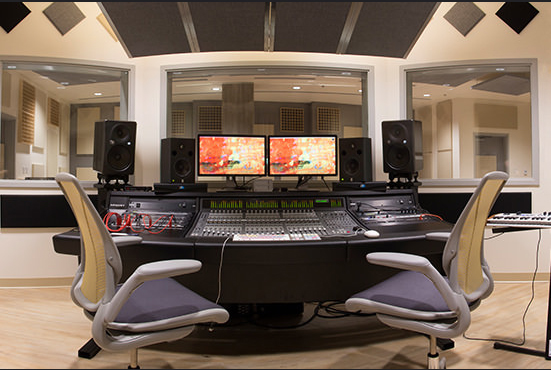
Audio Lab at Melrose Center via Flickr
“The studio personnel aid in-class development which prepares patrons with the real world skills to get the jobs they want and do well in those areas. We’re always coming up with ideas for new classes and programs to offer the public, as well as creative tech talks and scavenger hunts, where patrons are given the task of photographing items in the library and sharing them with the class.”
“Librarians have to have an open mind too with this and learn from the new trend of employees. The new employees who specialize in these media understand the audience and bring that knowledge into the library.”
Q: How is the engagement with the technologies available in the Melrose Center?
A: “In our current monthly program booklet, we have 15 pages of classes, averaging 20-25 classes per page that we offer to library cardholders for free. So, I guess you could say it’s been pretty stellar! We’re offering classes like logo design and development, programming, object oriented programming, game design, using driving simulators, creating talking photo frames, and so on. It’s like a never ending list!”
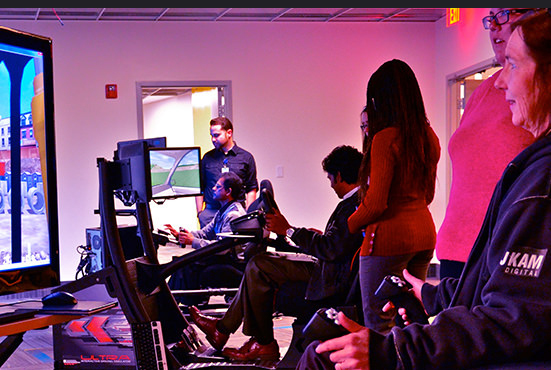
Audio Lab at Melrose Center via Flickr
“We recently received a grant from the city of Orlando and now offer sewing classes. We purchased 10 sewing machines from the grant, and even in the beginning stages of the class, patrons can take these new skills and use them outside of the library. We’re also proud of our programming classes, offering from the very basic to the complex class ranges.Our goal is to encourage collaboration and people working off of each other, bringing their ideas to the table and sharing with others who could in turn help them, like musicians coming together with graphic artists to design their CD cover, etc.”
Q: Many critics call spaces like these, maker spaces or tech learning centers, simply trends or fads that will die out in the next few years. What do you think of this?
A: “Some people are afraid of change. I’d like to ask them, what’s their alternative? Lending of hard copies is slowing down, and we’re trending towards digital. Digital producers could bypass libraries at the drop of a hat. Are these maker-space naysayers thinking long term for their communities? They need to think about these things because otherwise they’ll have the real estate and staff without the patrons coming by. Services have been evolving for a long time, but how can you keep up with the digital era and people’s different needs?”
“What will you do to justify your getting tax money then? How will you stay relevant to your community? People want opportunities to learn and share that experience with others in their community. We offer a painting class, something we thought might be fun. The class, to our surprise, filled up as soon as it was announced, and a waiting list of 12 people came from it for that one and the next. Our community is responding so positively across the range. Also, many more people work from home these days, but people want human contact, Libraries will provide that human contact. You can get amazon and the groceries delivered, but libraries provide the socialization.”
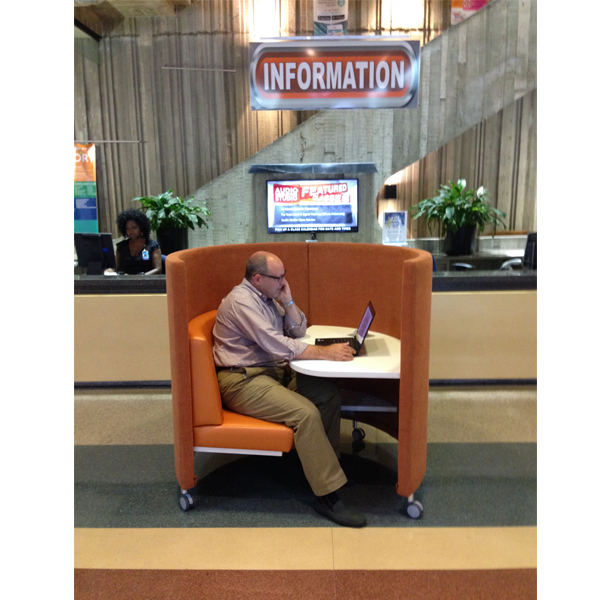
Joe Agati finds his info at the Orlando PL information desk
“These learning centers also benefit as providers of free classes and free tools. We’ve had people tell us they wanted to go to Full Sail Academy to learn audio, but many couldn’t go. A man told us he wished he’d known before his friends heard about the library and became disappointed about the free resources they were missing out on in the Melrose Center.”
Q: With such an amazing and innovative space, have you gotten much attention or many visitors who are looking to engage in your library?
A: “We’ve had plenty of visitors from all over the world! From Brazil, Thailand, visitors from Florida, county administrators, etc. A group from LAMA asked to go through the library and check out the space recently, too. We’re looking forward to seeing them next summer at ALA!
“We’ve also seen our patron portfolio increase, again, and about 75-100 new patron sign ups are directly related to the Melrose center! We think this represents the changing face of the library as we know it. Those not paying attention will be left behind, and wondering what they did wrong.”
Q: Do you have any closing comments for our readers?
A: “One thing we’ve found important for our patrons is that parents look upon libraries for camps or classes to supplement what kids are learning in school. We always end up having to open additional classes to provide for the community in after school programs. We offer STEM classes and basics in math especially. We’re providing arenas for children to learn behind the scenes, but it’s fun and hands on for them. Teachers even come to the Melrose center with their classes to tour and work with the classes there and programs.”

Robotics Lab at Melrose Center via Flickr
“I think the whole idea of bringing technology to the community is extremely important and an integral part of libraries of the future, both public libraries and academic libraries. You always get early adopters on certain things, but some are intimidated or can’t afford the technologies for their own homes. Libraries are a good place for citizens to give these things a try before personally investing in say an audio production or video production program. Libraries help you understand the technology that’s becoming more and more necessary in our day to day lives.”
Libraries have not always been free entities. When they first began, many required membership, and once acquired it meant you belonged to an elite institution from which you could acquire priceless knowledge and skills from around the globe. Libraries shifted, seeing the value in providing these same resources for the public, sans ego and restrictive membership requirements. The Orange County Library System continues to perpetuate this mission and ideal, to provide the best resources to their community allowing people to better their lives through knowledge and experience gained by choice at their local public library.
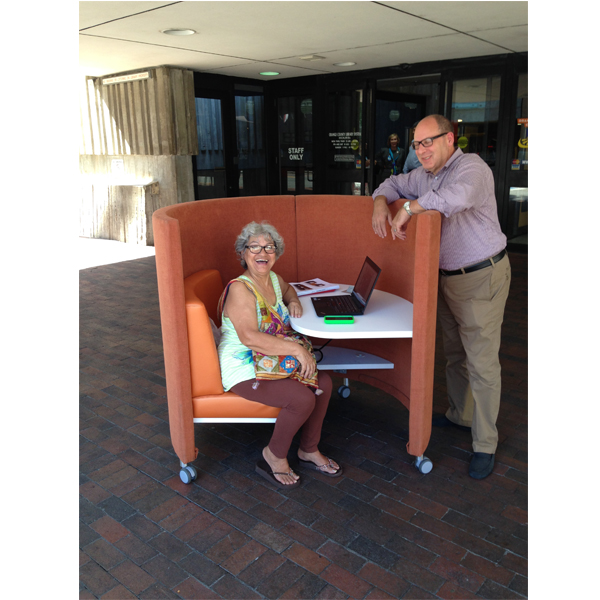
Joe Agati & Orlando PL visitor testing out The POD
Libraries are community centers at heart, and maintaining relevancy is perhaps more important now than ever, giving communities all the more reason to rally behind their local institutions! By listening to their community’s needs, and responding accordingly with the appropriate resources, the Melrose Center showcases just how modern libraries are embracing technology with open arms to keep their communities thriving and learning. And that is no passing trend.
AGATI would like to thank Mary Ann Hodel and the Orange County Library System staff for their time and taking part in the interview. For more information on the Melrose Center, visit their website, or contact Mary Ann Hodel.
